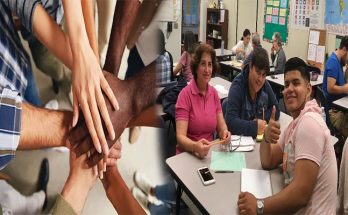Adult education consists of a variety of courses. It includes self-directed study without libraries or other facilities, broadcast programs, correspondence courses, group discussions, study circles, colloquia, seminars, workshops, and residential conferences. It can also include formal study in a classroom. In the latter, adults take a leadership role in class activities. Regardless of its purpose, adult education can benefit individuals in a variety of ways.
Vocational education
Vocational education is a subset of adult education. It focuses on developing skills that are needed to enter a specific occupational field. It is offered in public and private institutions, both 4-year and less-than-four-year. Vocational education participation is highly variable. The percentage of students enrolled in a particular program varies by demographic factor. For example, students in private proprietary schools are more likely to take a trade or business major than their peers in public four-year institutions.
The goal of vocational education is to make students “work ready” upon graduation. This is done by providing hands-on training and practical education that will allow students to enter their chosen profession. It combines classroom learning with hands-on experience to give students a complete understanding of the concepts and duties in their field.
Continuing education
Adults who have completed college or a high school diploma can enroll in continuing education courses. These courses can help an adult improve their skills, meet licensing requirements, or even change their careers. They can also help an adult return to school after a long break. Continuing education courses are generally short and focused, and can take the form of classes or full certificate courses. Some may also require an exam. Unlike traditional college programs, adult continuing education classes do not lead to a degree, but they are still an excellent way to further your education.
The Handbook of Adult and Continuing Education brings together 75 of the world’s leading authors in the field to provide a comprehensive view of the field. Its comprehensive coverage of the core processes of adult education is complemented by expanded discussion of topics such as technology and social justice. The text also looks at the importance of a broad view of adult education and its impact on society.
Study by correspondence
Study by correspondence is a method for providing education to nonresidents by sending lessons and assignments via mail. Students are expected to return completed work. This method is used widely by businesses, the armed forces, and governments in several countries. It supplements other forms of education by making independent study courses widely accessible.
Study by correspondence is an option that has numerous advantages over traditional on-campus courses. Courses may be completed more quickly, and students are not subjected to the time commitment that is required for a traditional college or university. Study by correspondence also offers flexibility in your schedule, and you can choose which courses you want to pursue.
It is becoming increasingly common for adult learners to complete their education by distance. The flexibility of study by correspondence offers an opportunity for adults to pursue a degree at their own pace, regardless of where they live or what their schedules require. This type of distance education provides an exemplary learning experience that is available at any time.
Continuing education for cultural betterment
Adult education for cultural betterment is offered in a variety of forms, from cooking classes to foreign language classes. These classes may be useful for acquiring information about another culture, learning a new language, or even gaining valuable experience. Many courses also include cultural activities. These courses can be a good way to learn new things and make new friends.
The earliest forms of adult education focused on literacy as illiteracy was often associated with sin. Griffith Jones operated peripatetic Welsh charity schools from 1740 to 1770. Robert Raikes organized Sunday schools in 1780, and Robert Owen incorporated adult education in model villages. In 1814, Thomas Pole published a history of adult schools. He revised it in 1816.
Continuing education for lifelong learning
An important issue in addressing adult education is how to engage adults in lifelong learning. Low participation rates are a problem, particularly among vulnerable groups. Community-based ALE institutions, such as CLCs, have an important role to play. CLCs typically cater to adults and offer opportunities for engagement in a variety of thematic areas.
In adult education, the learner’s experience is often the most valuable resource. This means that adult education should enhance and provide meaning to all kinds of experience. This, in turn, enhances the learner’s autonomy and cognitive abilities. In addition, Knowles has proposed a model of self-directed learning, in which individuals diagnose their learning needs, set goals, choose appropriate learning strategies, and evaluate their learning results. In this way, adult education should facilitate this process, and should not be viewed as a burden on the student.
Lifelong learning should aim to create ethical spaces, allowing participants to interact with different knowledge traditions and promote self-empowerment. It should also strive to foster a diverse and inclusive environment where students can engage in critical conversations around race, class, and gender. This will foster deeper understandings among diverse cultures and knowledge systems.





